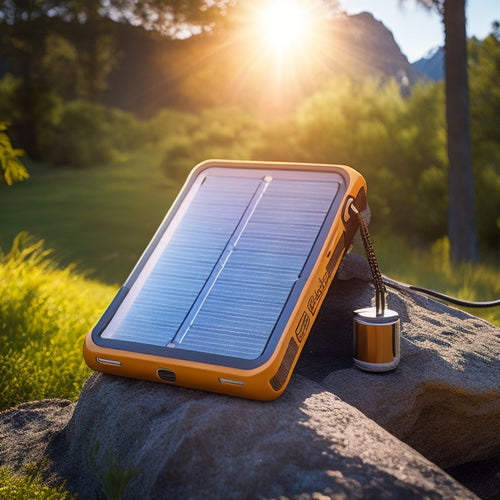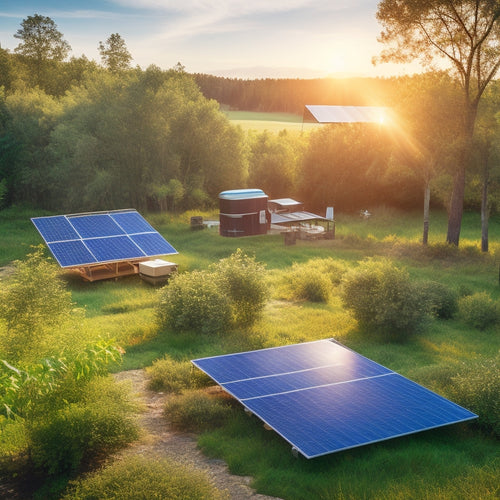
Components of Residential Solar Power Systems
Share
In a residential solar power system, several key components work together to optimize energy generation and usage. You'll find solar panels, which convert sunlight into electricity, and inverters, responsible for changing direct current to alternating current for home use. Energy storage systems, like batteries, allow you to store excess power for later use. Understanding each component's efficiency and functionality is essential to achieving your energy goals. Proper configuration based on your consumption patterns enhances overall performance. If you investigate further, you'll uncover more knowledge into maximizing your solar investment.
At a Glance
- Solar panels are essential components that convert sunlight into electricity, significantly impacting system efficiency.
- Inverters are crucial for converting DC electricity from solar panels into AC electricity for home use.
- Energy storage systems allow for the capture and storage of excess energy, enhancing a home's energy independence.
- Proper configuration and selection of key components optimize renewable energy generation and overall system performance.
- Understanding energy consumption patterns aids in determining the appropriate system size and configuration for residential needs.
Cost-Effective Energy Solution
When considering a residential solar power system, you need to evaluate the long-term savings potential that can greatly reduce your energy costs.
Solar power grids can lead to considerable energy savings, potentially eliminating bills, allowing homeowners to enjoy the benefits of financial benefits of solar power.
Additionally, various incentives and rebates are available, which can further enhance the financial viability of your investment.
Long-Term Savings Potential
Investing in a residential solar power system can lead to substantial long-term savings, converting your energy expenses into a manageable and predictable budget.
By choosing the right financing options, you can minimize upfront costs while taking advantage of low-interest rates, making your shift to solar energy more affordable. The installation process, when handled by experienced professionals, guarantees peak performance and system longevity, allowing you to enjoy clean energy for decades.
As technological advancements continue to improve solar efficiency, you'll see reductions in maintenance costs, further enhancing your savings. With a well-maintained system, you can achieve energy independence, freeing yourself from fluctuating utility rates and providing peace of mind.
Moreover, a residential solar setup can greatly increase your property's resale value. Potential buyers often view solar installations as a significant asset, understanding the future savings on energy bills it offers.
Even if you remain connected to the grid, your solar system can offset energy costs, maximizing your savings. Ultimately, a residential solar power system represents a strategic investment in both your financial future and your commitment to sustainable energy.
Incentives and Rebates Available
Leveraging available incentives and rebates can considerably reduce the overall cost of installing a residential solar power system. Federal tax credits, such as the Investment Tax Credit (ITC), allow you to deduct a significant percentage of your solar installation costs from your federal taxes.
Additionally, many states offer state rebates that can further lower upfront expenses. Local incentives may come from municipalities or utility providers, making solar adoption even more attractive.
You might also investigate installation grants and financing options like solar loans, which can spread the cost over time while allowing immediate energy savings. Utility programs may include performance-based incentives, rewarding you for the energy your system generates.
Net metering enables you to receive credit for excess energy fed back into the grid, effectively lowering your energy bills.
If you're considering a community solar project, this option allows you to invest in solar energy without needing to install panels on your property.
Environmental Impact Reduction
By integrating residential solar power systems, you notably decrease your carbon footprint, contributing to a cleaner environment.
These systems utilize renewable energy, reducing reliance on fossil fuels and lowering greenhouse gas emissions.
As you shift to solar energy, you not only save on energy costs but also play an essential role in promoting sustainable practices.
Additionally, embracing solar power enhances energy independence, allowing homeowners to generate clean energy and mitigate the impacts of climate change through financial incentives.
Decreased Carbon Footprint
Solar panels on your roof can considerably decrease your carbon footprint, contributing to a substantial reduction in greenhouse gas emissions. By capturing solar energy, you replace traditional fossil fuel sources that emit carbon dioxide and other harmful pollutants. This change not only enhances your energy efficiency but also aligns with sustainability practices that promote environmental stewardship.
When you employ solar power, you're actively participating in a system that minimizes reliance on nonrenewable resources. Each kilowatt-hour of solar energy produced means one less kilowatt-hour generated from fossil fuels, which is a direct win for the planet. Over time, this shift leads to significant decreases in carbon emissions, helping to mitigate climate change impacts.
Moreover, integrating solar energy into your home enables you to take control of your energy consumption. You can optimize your energy use, further enhancing energy efficiency. This proactive approach not only benefits the environment but also positions you as a leader in sustainable living.
Renewable Energy Source
Utilizing renewable energy sources like solar power greatly contributes to reducing environmental impact. By capturing solar energy, you tap into a sustainable and clean resource that minimizes greenhouse gas emissions. The advancements in renewable energy technology enhance the efficiency of solar systems, making them more accessible and effective for residential use.
Here's a breakdown of the solar energy benefits you can expect:
| Benefit | Description | Impact on Environment |
|---|---|---|
| Reduced Emissions | Solar panels generate electricity without harmful emissions. | Lowers air pollution levels. |
| Energy Independence | With solar, you rely less on fossil fuels. | Decreases dependency on non-renewable resources. |
| Decreased Water Use | Solar energy uses minimal water compared to traditional power generation. | Conserves essential water resources. |
| Long-term Savings | After initial costs, solar power reduces electricity bills. | Encourages sustainable economic practices. |
| Job Creation | The solar industry promotes new job opportunities. | Supports local economies and communities. |
Key System Components Overview
To understand residential solar power systems, you need to grasp the key components that drive their efficiency.
Solar panels convert sunlight into electricity, while inverters play a vital role in altering that electricity into a usable form for your home.
Additionally, incorporating energy storage systems allows homeowners to store excess energy, enhancing their energy independence and reducing reliance on the grid 5 Essential Home Energy Freedom Systems.
Solar Panels Explained
When considering a residential solar power system, understanding the key components of solar panels is essential for optimizing energy production and efficiency. Modern solar technology advancements have notably enhanced solar panel efficiency, allowing you to generate more electricity from the same amount of sunlight.
Here's a quick overview of the main types of solar panels:
| Type | Efficiency Rate | Typical Use Case |
|---|---|---|
| Monocrystalline | 15-22% | Limited roof space |
| Polycrystalline | 13-16% | Larger areas, budget-friendly |
| Thin-Film | 10-12% | Flexible applications |
| Bifacial | 20-25% | Dual-sided energy capture |
| Building-Integrated | 10-15% | Aesthetic integration |
Choosing the right type of solar panel can greatly impact your energy output and overall savings. Factors like local climate, roof orientation, and shading can affect the efficiency of your solar panels. By carefully selecting the right technology and configuration, you can utilize the freedom that comes from generating your own renewable energy, contributing to a sustainable future while reducing your electricity bills.
Inverter Functionality Insights
After selecting the right solar panels for your residential system, the next important component to understand is the inverter. Inverters convert the direct current (DC) generated by your solar panels into alternating current (AC) for your home's use.
There are several inverter types to take into account, including string inverters, microinverters, and power optimizers, each with unique inverter features and compatibility considerations.
Inverter efficiency is vital; higher efficiency means more of your solar energy is converted into usable power. Look for brands known for their reliability and innovations in inverter technology.
The lifespan of an inverter can vary, typically ranging from 5 to 15 years, so think about potential inverter upgrades and maintenance requirements to guarantee ideal performance.
Proper inverter placement also affects performance, as shading and ventilation are significant factors. Regular inverter maintenance can help extend its lifespan and guarantee consistent operation.
By understanding these elements, you enable yourself to make informed decisions about your system, maximizing energy independence and reducing reliance on traditional power sources.
Always evaluate inverter efficiency, maintenance needs, and future upgrade options to improve your solar experience.
Selecting Based on Energy Needs
To effectively select a residential solar power system, you need to assess your energy consumption patterns.
Understanding when your peak usage times occur will help you determine the ideal system size and configuration. This analysis guarantees that your solar setup meets your specific energy demands efficiently.
Additionally, implementing energy-efficient upgrades like LED bulbs can further reduce your overall energy needs. This allows for a more streamlined solar system design that maximizes energy-efficient upgrades.
Assessing Energy Consumption Patterns
Understanding your energy consumption patterns is essential when selecting a residential solar power system customized to your needs. Start by conducting an energy audit to gather data on your energy usage over time. This will help you identify consumption trends and seasonal variations that impact your electricity requirements.
Next, analyze your household habits to pinpoint peak demand periods. Understanding these patterns allows you to evaluate your home's solar capacity effectively. Use efficiency metrics to assess which appliances consume the most energy and consider behavioral changes that could enhance efficiency. For instance, adjusting your usage during off-peak hours can greatly reduce your overall energy load.
Performing a load analysis provides knowledge into which devices are critical and how they contribute to your total consumption. By aligning your expectations with this knowledge, you can optimize your solar power system to meet your specific energy needs.
Evaluating Peak Usage Times
Evaluating peak usage times is essential for optimizing your residential solar power system's performance and efficiency. By identifying when your household experiences peak demand, you can tailor your solar setup to meet these specific energy needs.
Start by analyzing your usage patterns throughout the day and across different seasons. This data will help you determine when your energy consumption surges—typically during mornings when appliances are in use or evenings when lighting and electronics are needed.
Once you've identified these peak times, you can make informed decisions about system size and battery storage. For instance, if your energy consumption spikes during late afternoon, it's advantageous to install a solar system that produces maximum output during those hours.
Additionally, consider integrating a battery storage solution to store excess energy generated during sunny periods, allowing you to tap into this power during peak demand times.
Higher Long-Term Savings Potential
By investing in a residential solar power system, you can greatly reduce your energy bills over time.
The initial costs may seem high, but the long-term savings from decreased reliance on the grid can offset these expenses.
Analyzing your energy consumption patterns will help you project these savings accurately.
Reduced Energy Bills
Residential solar power systems can considerably lower your energy bills, offering a persuasive financial advantage over time. By utilizing the sun's abundant energy, you can reduce your reliance on grid electricity, which typically incurs rising costs. This shift not only enhances your energy efficiency but also stabilizes your long-term expenses.
With solar financing options available, you can invest in a system with little to no upfront cost, making it accessible for many homeowners. These financing solutions allow you to pay for your system over time, often through savings generated on your monthly energy bills. As utility rates continue to climb, the financial benefits of solar become increasingly appealing.
Moreover, as you generate your own electricity, you're less vulnerable to fluctuations in energy prices, granting you greater control over your financial future. After the initial investment period, your savings can grow exponentially, leading to a potential zero-cost energy scenario.
Embracing solar power isn't just an environmentally friendly choice; it's a strategic financial decision that aligns with your desire for freedom from escalating energy costs. Investing in solar can reconfigure your energy consumption into a sustainable and economically advantageous practice.
Frequently Asked Questions
How Do Solar Panels Perform in Cloudy Weather?
In cloudy weather, solar panels still generate energy, though their efficiency decreases. Your energy output might drop by 10-25%, but they can capture diffused sunlight, ensuring you maintain some level of power independence even on overcast days.
What Is the Lifespan of a Solar Power System?
A solar power system typically lasts 25 to 30 years, depending on solar panel longevity and system maintenance. Regular upkeep can maximize efficiency, ensuring you enjoy energy independence while minimizing costs over the system's lifespan.
Can Solar Systems Be Installed on All Roof Types?
Yes, solar systems can be installed on various roof types, but roof angles may present installation challenges. You'll need to assess your roof's structure to guarantee ideal performance and efficiency for your solar power system.
How Does Net Metering Work With Solar Power?
Net metering lets you sell excess solar energy back to the grid, providing financial benefits. However, challenges like varying regulations and potential compensation changes can affect your savings and system viability. Stay informed to maximize advantages.
Are There Incentives for Installing Residential Solar Systems?
Did you know that over 90% of homeowners benefit from federal tax credits when installing solar? With state rebates, local incentives, and innovative solar financing, you can greatly reduce costs and enhance your energy independence.
Explore More
In choosing a residential solar power system, you're not just investing in energy independence; you're also embracing sustainability. While upfront costs may seem intimidating, the long-term savings and environmental benefits starkly contrast with traditional energy sources. By understanding the key components and tailoring your system to your energy needs, you pave the way for a more efficient future. Ultimately, you're not just making a choice for today but securing a greener tomorrow for generations to come.
Related Posts
-

Net Metering in Renewable Energy's Future
Net metering's future is vital for driving renewable energy growth and financial savings. You can reduce your electri...
-

Fastest Solar Chargers for Emergency Power
When choosing the fastest solar chargers for emergency power, you need to focus on features like rapid charging capab...
-

Top Off Grid Solar Batteries for Renewable Energy
When seeking top off-grid solar batteries for renewable energy, consider options with advanced battery chemistry, suc...


